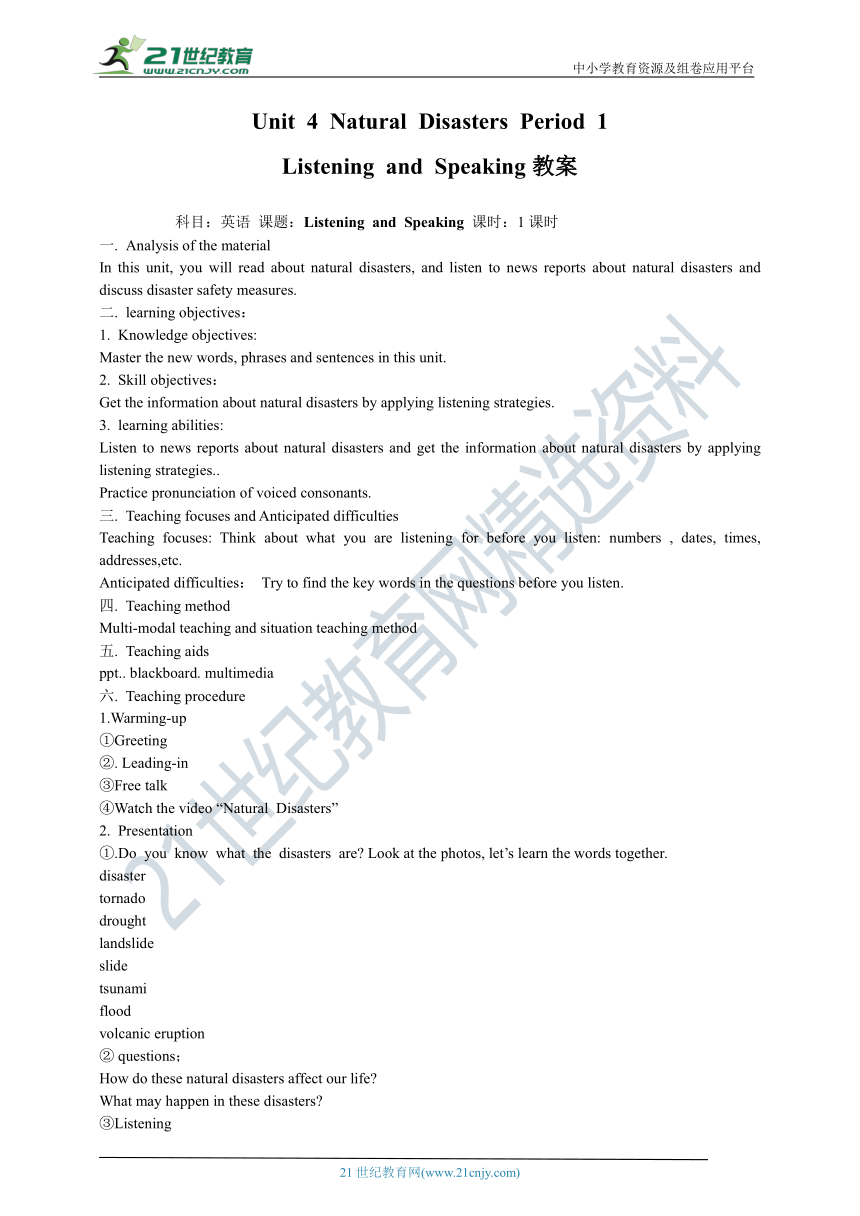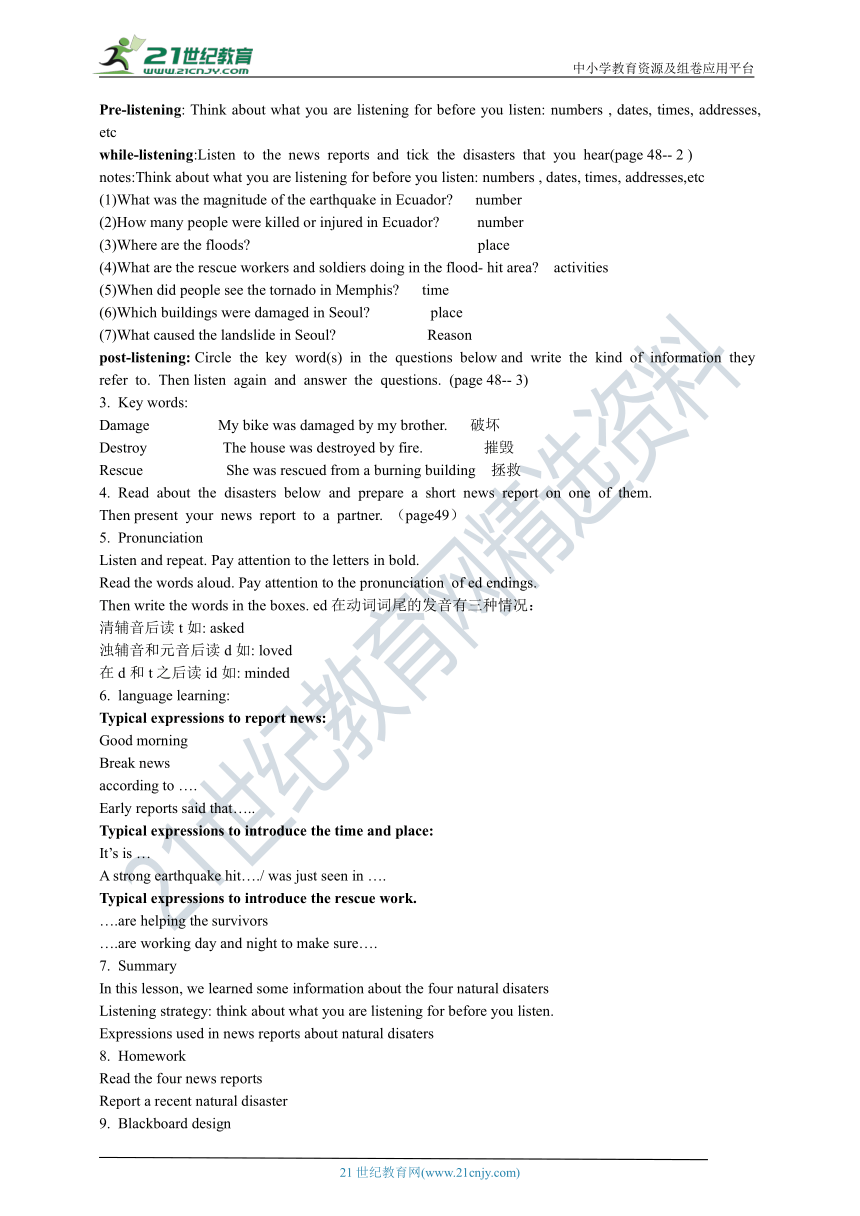Unit 4 Natural Disasters Period 1 Listening and Speaking教案
文档属性
| 名称 | Unit 4 Natural Disasters Period 1 Listening and Speaking教案 |

|
|
| 格式 | zip | ||
| 文件大小 | 1.3MB | ||
| 资源类型 | 试卷 | ||
| 版本资源 | 人教版(2019) | ||
| 科目 | 英语 | ||
| 更新时间 | 2021-10-15 10:57:54 | ||
图片预览


文档简介
中小学教育资源及组卷应用平台
Unit 4 Natural Disasters Period 1
Listening and Speaking教案
科目:英语 课题:Listening and Speaking 课时:1课时
Analysis of the material
In this unit, you will read about natural disasters, and listen to news reports about natural disasters and discuss disaster safety measures.
learning objectives:
Knowledge objectives:
Master the new words, phrases and sentences in this unit.
Skill objectives:
Get the information about natural disasters by applying listening strategies.
learning abilities:
Listen to news reports about natural disasters and get the information about natural disasters by applying listening strategies..
Practice pronunciation of voiced consonants.
Teaching focuses and Anticipated difficulties
Teaching focuses: Think about what you are listening for before you listen: numbers , dates, times, addresses,etc.
Anticipated difficulties: Try to find the key words in the questions before you listen.
Teaching method
Multi-modal teaching and situation teaching method
Teaching aids
ppt.. blackboard. multimedia
Teaching procedure
1.Warming-up
①Greeting
②. Leading-in
③Free talk
④Watch the video “Natural Disasters”
Presentation
①.Do you know what the disasters are Look at the photos, let’s learn the words together.
disaster
tornado
drought
landslide
slide
tsunami
flood
volcanic eruption
② questions;
How do these natural disasters affect our life
What may happen in these disasters
③Listening
Pre-listening: Think about what you are listening for before you listen: numbers , dates, times, addresses, etc
while-listening:Listen to the news reports and tick the disasters that you hear(page 48-- 2 )
notes:Think about what you are listening for before you listen: numbers , dates, times, addresses,etc
(1)What was the magnitude of the earthquake in Ecuador number
(2)How many people were killed or injured in Ecuador number
(3)Where are the floods place
(4)What are the rescue workers and soldiers doing in the flood- hit area activities
(5)When did people see the tornado in Memphis time
(6)Which buildings were damaged in Seoul place
(7)What caused the landslide in Seoul Reason
post-listening: Circle the key word(s) in the questions below and write the kind of information they
refer to. Then listen again and answer the questions. (page 48-- 3)
Key words:
Damage My bike was damaged by my brother. 破坏
Destroy The house was destroyed by fire. 摧毁
Rescue She was rescued from a burning building 拯救
Read about the disasters below and prepare a short news report on one of them.
Then present your news report to a partner. (page49)
Pronunciation
Listen and repeat. Pay attention to the letters in bold.
Read the words aloud. Pay attention to the pronunciation of ed endings.
Then write the words in the boxes. ed在动词词尾的发音有三种情况:
清辅音后读t如: asked
浊辅音和元音后读d如: loved
在d和t之后读id如: minded
language learning:
Typical expressions to report news:
Good morning
Break news
according to ….
Early reports said that…..
Typical expressions to introduce the time and place:
It’s is …
A strong earthquake hit…./ was just seen in ….
Typical expressions to introduce the rescue work.
….are helping the survivors
….are working day and night to make sure….
Summary
In this lesson, we learned some information about the four natural disaters
Listening strategy: think about what you are listening for before you listen.
Expressions used in news reports about natural disaters
Homework
Read the four news reports
Report a recent natural disaster
Blackboard design
Unit 4 Natural Disasters
disaster
tornado
drought
landslide
slide
tsunami
flood
volcanic eruption
Damage My bike was damaged by my brother. 破坏
Destroy The house was destroyed by fire. 摧毁
Rescue She was rescued from a burning building 拯救
How do these natural disasters affect our life
What may happen in these disasters
Think about what you are listening for before you listen: numbers , dates, times, addresses,ect
Typical expressions to report news:
Good morning
Break news
according to ….
Early reports said that…..
Typical expressions to introduce the time and place:
It’s is …
A strong earthquake hit…./ was just seen in ….
Typical expressions to introduce the rescue work.
….are helping the survivors
….are working day and night to make sure….
21世纪教育网 www.21cnjy.com 精品试卷·第 2 页 (共 2 页)
HYPERLINK "http://21世纪教育网(www.21cnjy.com)
" 21世纪教育网(www.21cnjy.com)
Unit 4 Natural Disasters Period 1
Listening and Speaking教案
科目:英语 课题:Listening and Speaking 课时:1课时
Analysis of the material
In this unit, you will read about natural disasters, and listen to news reports about natural disasters and discuss disaster safety measures.
learning objectives:
Knowledge objectives:
Master the new words, phrases and sentences in this unit.
Skill objectives:
Get the information about natural disasters by applying listening strategies.
learning abilities:
Listen to news reports about natural disasters and get the information about natural disasters by applying listening strategies..
Practice pronunciation of voiced consonants.
Teaching focuses and Anticipated difficulties
Teaching focuses: Think about what you are listening for before you listen: numbers , dates, times, addresses,etc.
Anticipated difficulties: Try to find the key words in the questions before you listen.
Teaching method
Multi-modal teaching and situation teaching method
Teaching aids
ppt.. blackboard. multimedia
Teaching procedure
1.Warming-up
①Greeting
②. Leading-in
③Free talk
④Watch the video “Natural Disasters”
Presentation
①.Do you know what the disasters are Look at the photos, let’s learn the words together.
disaster
tornado
drought
landslide
slide
tsunami
flood
volcanic eruption
② questions;
How do these natural disasters affect our life
What may happen in these disasters
③Listening
Pre-listening: Think about what you are listening for before you listen: numbers , dates, times, addresses, etc
while-listening:Listen to the news reports and tick the disasters that you hear(page 48-- 2 )
notes:Think about what you are listening for before you listen: numbers , dates, times, addresses,etc
(1)What was the magnitude of the earthquake in Ecuador number
(2)How many people were killed or injured in Ecuador number
(3)Where are the floods place
(4)What are the rescue workers and soldiers doing in the flood- hit area activities
(5)When did people see the tornado in Memphis time
(6)Which buildings were damaged in Seoul place
(7)What caused the landslide in Seoul Reason
post-listening: Circle the key word(s) in the questions below and write the kind of information they
refer to. Then listen again and answer the questions. (page 48-- 3)
Key words:
Damage My bike was damaged by my brother. 破坏
Destroy The house was destroyed by fire. 摧毁
Rescue She was rescued from a burning building 拯救
Read about the disasters below and prepare a short news report on one of them.
Then present your news report to a partner. (page49)
Pronunciation
Listen and repeat. Pay attention to the letters in bold.
Read the words aloud. Pay attention to the pronunciation of ed endings.
Then write the words in the boxes. ed在动词词尾的发音有三种情况:
清辅音后读t如: asked
浊辅音和元音后读d如: loved
在d和t之后读id如: minded
language learning:
Typical expressions to report news:
Good morning
Break news
according to ….
Early reports said that…..
Typical expressions to introduce the time and place:
It’s is …
A strong earthquake hit…./ was just seen in ….
Typical expressions to introduce the rescue work.
….are helping the survivors
….are working day and night to make sure….
Summary
In this lesson, we learned some information about the four natural disaters
Listening strategy: think about what you are listening for before you listen.
Expressions used in news reports about natural disaters
Homework
Read the four news reports
Report a recent natural disaster
Blackboard design
Unit 4 Natural Disasters
disaster
tornado
drought
landslide
slide
tsunami
flood
volcanic eruption
Damage My bike was damaged by my brother. 破坏
Destroy The house was destroyed by fire. 摧毁
Rescue She was rescued from a burning building 拯救
How do these natural disasters affect our life
What may happen in these disasters
Think about what you are listening for before you listen: numbers , dates, times, addresses,ect
Typical expressions to report news:
Good morning
Break news
according to ….
Early reports said that…..
Typical expressions to introduce the time and place:
It’s is …
A strong earthquake hit…./ was just seen in ….
Typical expressions to introduce the rescue work.
….are helping the survivors
….are working day and night to make sure….
21世纪教育网 www.21cnjy.com 精品试卷·第 2 页 (共 2 页)
HYPERLINK "http://21世纪教育网(www.21cnjy.com)
" 21世纪教育网(www.21cnjy.com)
